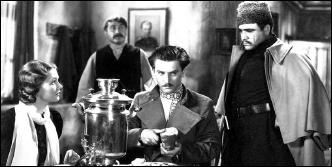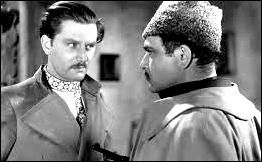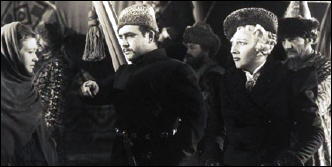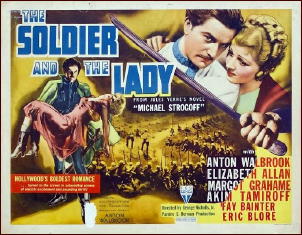Thu 5 Jun 2014
A Movie Review by David Vineyard: THE SOLDIER AND THE LADY (1937).
Posted by Steve under Action Adventure movies , Reviews[19] Comments
THE SOLDIER AND THE LADY. RKO Radio Pictures, 1937. Anton Walbrook (debut), Elizabeth Allen, Akim Tamiroff, Margot Grahame, Fay Bainter (debut), Eric Blore, Edward Brophy, Paul Guilfoyle, Paul Harvey. Screenplay by Mortimer Offner, Anthony Veiller, Anne Morrison Chapin, based on Michael Strogoff Courier of the Tzar by Jules Verne. Directed by George Nichols Jr. as George Nicholls Jr.
This remains one of the most faithful and well done of all Jules Verne’s books adapted to film, an epic portrayal of Verne’s novel about a heroic courier for Alexander II who brings down the Moslem Tartar rebellion of 1870 and saves Russia while finding love and facing one daunting task after another.
Though Strogoff is another of Verne’s naturalist romantic heroes in the line of Ned Land from 20,000 Leagues Under the Sea and Nik Dek from Castle Carpathian, he has also been rightfully called a 19th century James Bond.
The splendid cast is the first great asset of this film. Anton Walbrook made his American film debut as Strogoff, and proves a fine swashbuckler more adept than most at the dramatic scenes (or melodramatic in this case). It isn’t as subtle as many of his fine later films, but then it isn’t supposed to be, and he more than suggests the characters nobility and courage.
Elizabeth Allen (wife of Robert Montgomery and mother of Elizabeth) is the heroine Nadia, beautiful, aristocratic and innocent; Margot Grahame the femme fatale Zangarra with a heart that can be melted by a noble hero; and Fay Bainter in her strong film debut is Michael’s mother. Eric Blore and Edward Brophy are English and American war correspondents for comedy relief, and Paul Harvey the Tzar.
But the film is stolen to a great extent by Akim Tamiroff as the perfectly named Ivan Ogareff, the traitorous, brutal, sly, cunning, and sadistic Tartar agent plotting to use the uprising to grab power and wealth. It’s Tamiroff at his scenery chewing best as a thorough going rotter, and audiences must have cheered when he meets his deserved end.
The Tzar himself dispatches Strogoff as a courier to his brother in Irkutsk with instructions that will save him and the city from the Tartar’s treachery, adding for Michael not to even acknowledge his mother, Fay Bainter, whom he will see on his journey to the place of his birth.
Things go bad quickly: the lovely Nadia is captured when the Tartar’s assault a barge she and Strogoff travel on looking for the courier they know the Tzar sent, and he is left for dead in the river. He escapes but is now afoot, and the Tartars are closing in. Finally he too is captured and Ogareff’s mistress Zangarra, Margot Grahame, who saw him in Moscow is to identify the courier, but she lies and Ogareff must threaten to torture the courier’s mother to bring Strogoff out.
He comes forth of course, and confesses he destroyed the papers, and in one of the most brutal scenes in Verne’s works Ogareff blinds him with a torch, a crime so brutal that Strogoff’s mother’s heart fails at the horror. It’s pretty strong stuff here too, and unlike almost anything else in Verne’s fiction.
Now Ogareff poses as the Tzar’s courier to deceive the Tzar’s brother, and Strogoff and Nadia struggle to reach Irkutsk in time.
Ogareff hasn’t calculated on one thing — Strogoff isn’t blind — the tears he wept saying goodbye to his mother kept the flames from burning his eyes. He slays Ogareff, the city is saved, the rebellion put down with its leader dead, and Stogoff is given a medal by the Tzar and promoted to Colonel as the Tzar praises his heroic mother’s sacrifice.
Walbrook had starred in the 1936 French version of the story so RKO wisely chose him in the role so they could use the sweeping scenes of battle and marching armies filmed for it. It proved a wise choice and the film was a major hit. Granted it might have been better from one of the bigger studios like Warners or MGM with a director better suited to epics, but it is still a fine swashbuckler very close to Verne’s novel.
This was remade in the 1960‘s in Germany with Curt Jurgens as Strogoff (known both as Michael Strogoff and Soldier and a Lady) in color, and not a bad film itself, though difficult to find.
But it’s this version that is the standout, a handsome adaptation of the classic novel with a fine cast and many sweeping scenes from the French original. From the look of things it is clear the French version beats them both, but as far as I know it is lost, so like the scenes of the silent Gold included in The Magnetic Monster, this is all we have.





June 6th, 2014 at 8:50 am
This movie played on TCM at the end of May, but the short synopsis they provided didn’t sound interesting and I passed on recording it. If I had only known it was based on a Jules Verne novel, I may have done otherwise. My error!
PS. Sorry about the trailer. It was the best I could do. At least you can see the players and some of the scenes.
June 6th, 2014 at 9:49 am
I saw most of it last week on TCM. I agree totally about Tamiroff. You might have been lucky, Steve not to have recorded it since the sound was out of synch. I’ve noticed several films have been out of synch lately on TCM.
June 6th, 2014 at 10:21 am
This may be a subject for further research but — there were several actresses known as Elizabeth Allen, and this one is from Britain and not the mother of Elizabeth Montgomery nor the wife of Robert. Please advise.
Re Michael Strogoff. I saw this on the big screen at a revival house in the mid-seventies. It was okay and well done, but Anton Walbrook for all his ability, was not a compelling romantic hero. Personally, I preferred the Classics Illustrated edition.
June 6th, 2014 at 12:48 pm
Walbrook was a sublime actor, but he was never really suited for the role of romantic lead. The closest is probably THE LIFE AND DEATH OF COLONEL BLIMP, where he plays a proud but fundamentally decent soldier. Some of my favourite performances of his are when he played really nasty or screwed-up characters. In THE RED SHOES he is so obsessed as to be totally inhuman, but his husband in GASLIGHT is a study in pure evil. He does a Jekyll/Hyde transformation from the beginning to the end of the movie without the need of make-up, and is totally convincing. “Ze roooobies Bella, ze roooooobies”.
June 6th, 2014 at 9:19 pm
They had little choice but to use Walbrook since he has numerous close ups in the French footage that would be difficult to match, and casting anyone else would have cost a small fortune in reshoots. He was no Errol Flynn, but he didn’t embarrass himself, and the French footage is outstanding.
I would argue that both Red Shoes and Gaslight are major romantic leads in the way most of James Mason’s early films are when he is playing the man women loved to hate or Ray Milland in So Evil My Love. It’s the main reason they cast Boyer in the role in the American version.
Barry
Unless TCM messed up, they showed the film as part of a day dedicated to Robert Montgomery’s wife Elizabeth Allen’s films. Not that they always get these things right. I think they showed a Montgomery/Allen film right before this.
June 6th, 2014 at 9:52 pm
David,
TCM should be the go-to source and sometimes it is. Not apparently in this case. This Elizabeth Allen was a British actress, Montgomery was married to an American girl. In fact both of his wives were named Elizabeth. Everything on-line requires cross referencing. On The Louis Hayward Facebook page a biographical entry under the heading about picks up material from IMDB, and most of it is wrong regarding parts that he played, a sexual encounter, and the spelling of a Broadway play that launched his Hollywood career. And, whoever wrote that mixes opinion, his, with factual information, some of the time. Have not figured out how to correct this as yet.
June 6th, 2014 at 10:11 pm
I’ve been tied up with several personal matters this week, and I haven’t had a chance to check out Elizabeth Allen until now.
Looking at the poster at the end of the review helps get rid of the confusion. The actress in SOLDIER was Elizabeth Allan, with an “a.” And Barry, you are right, she was a British actress most of whose films were made there. Here’s her IMDb page:
http://www.imdb.com/name/nm0019922/reference
June 7th, 2014 at 3:48 pm
David: The James Mason comparison is a good one, although when one talks of ‘romantic lead’ in regards to GASLIGHT I always think of Joseph Cotten in the remake. I’m not sure exactly what you’d call the ‘Man women love to hate’ role, although it’s a common enough one, especially in films of the period. Herbert Lom played lots of good looking but rather menacing foreigners in movies just after the war, very much in the manner of Walbrook. Who would be the modern version, I wonder?
June 7th, 2014 at 7:10 pm
Thanks Barry and Steve for clearing that up.
Bradstreet
Even when they play the type, most of today’s heart throbs are too boyish to play the kind of role Lom, Mason, Walbrook, Sanders, Zachary Scott, Louis Hayward, Marius Goring, and others often played. There was a set of actors who were equally at home as hero or villain and because of that added spice even when they played the most heroic of heroes. Even Errol Flynn and Stewart Granger sometimes played at the edges of that — Granger especially in In The Fog with wife Jean Simmons and a few others — not surprising as he is in a few of those James Mason films from the late forties and early fifties.
There are a few English actors like Rafe Fiennes, Rupert Everett, Daniel Day Lewis and one or two others who come closest, but I really can’t think of anyone else.
June 8th, 2014 at 6:49 am
Yes, Alan Rickman is another. It’s interesting that people tend to think of him as a screen baddy, but a look at his IMDB entry shows that he has played as many heroes as villains. I wonder if the Brit/European hegemony of this sort of character has something to do with the fact that a lot of these actors tend to think of themselves as Theatre actors who do Movies, rather than straightforward Movie stars. They’re less bothered about personifying a particular screen image, and are happy to hop between different character types.
June 8th, 2014 at 3:46 pm
British actors tend to be professional actors moving from television to film to theater and radio with much more ease than the ‘movie stars’ here. Ian McKellan for instance recently played Goldfinger in the newest BBC radio adaptation. I suspect that range is why they are cast in both kinds of films where American actors may stretch, but not as much. Still Ben Affleck has played some villains and Matt Damon was of course Tom Ripley in The Talented Mr. Ripley.
I hate to think that American film stars aren’t adept enough to play those roles, and prefer the idea that producers and casting directors are too narrow minded and frightened to risk casting them. Considering what films cost to make today it’s hard to expect them to take much of a gamble on audiences accepting favorites in those roles, even Hitchcock decided it was too big a gamble to let Cary Grant turn out a killer in Suspicion.
June 8th, 2014 at 6:12 pm
There are some excellent American film stars, but like you say, a major studio project can cost untold millions. It must be a terrifying gamble to cast too much against type (although Hitchcock struck gold when he cast Robert Walker and Anthony Perkins as murderers, which was very much against their previous screen types).
June 9th, 2014 at 8:46 am
Cary Grant does not play a killer in Suspicion because he never played killers, or villains, even though he portrayed occasionally disagreeable heroes. The British stars mentioned are essentially character actors, and in the Untied States character stars, the two great Charlie’s, Laughton and Coburn, moved with ease between sympathetic parts and nasty folk. This all goes to the kind of career someone is running. Today film World offers more variety, but we should remember that Grant, Gable, Cagney, Robert Montgomery, Stanwyck, invented through trial and error, what we now call film acting.
June 9th, 2014 at 8:47 am
…that of course, should be United not untied states, although when I read the stuff going these days…
June 9th, 2014 at 2:00 pm
The untied states are obviously where you go to get loose!
September 19th, 2015 at 10:56 pm
A great deal of the background looks like it was filmed in Russia. I.e. the Troika chase, where was it filmed. And where did they get the cast of really authentic extras?
October 26th, 2015 at 12:06 pm
I think that the movies where filmed in Germany, near Berlin: the French and the German versions where made in the same time, they just changed the actors between two takes but Adolf Wolhbrück (Anton Walbrook) who played the part of Strogoff in french and in german.
When they decided to make an English version, they kept some scenes (battles…) from the others movies and reshoot the scenes with dialogs; so they changed the actors but…Anton Walbrook who only changed his name: Adolf was not a very popular name at this time…
I would like to add that i think Walbrook was a very good romantic lead: after all, he played many romantic roles in his German or Austrian movies even in his English career he played these type of roles: for example as Prince Albert in “Victoria the Great”, his first role and hit in England.
Maybe some of you are influenced by his German accent because German accent = bad guy. But fortunately, he was not type cast as the “Bad Nazi Officer”, which was almost a miracle for a German/Austrian actor in this time!
October 30th, 2015 at 11:49 pm
Thanks, it was a great movie I had never heard of such a composite effort at filming. and to think it worked so well.
September 25th, 2020 at 9:45 pm
I taped the film off some station a few decades ago, possibly AMC. Until today, I never realized it was a hybrid of 2 or 3 films. Ed Brophy & Eric Blore (who I know from THE FALCON and LONE WOLF films) seem out of place, and they vanish before the climax arrives. The rest of the cast are excellent. I felt sorry when the “bad” girl got shot. Some of the battle scenes are EPIC and THRILLNG! That final fight between the hero & villain was a genuine knock-down-drag-out.
It’s never explained in words, but I believe the bad girl BRIBED the executioner so while he singed Strogoff, it wouldn’t be permanent damage. He seemed genuinely blinded, and later, surprised when his sight came back.
Growing up there was a paperback copy of “MICHAEL STROGOFF” in my house, which somehow I never read, and when years later I went looking for it, it had vanished. Verne wrote a TON of books, most non-SF, but only the tiniest handfull have been available in most stores in my lifetime. But online, you can probably find EVERYTHING he ever did in print.
There’s also a TON of comics adaptations of his books– but most are from overseas. A Spanish publisher in the 70s did no less than 50 of his, and I’ve also found a pile of them in Mexican digests. Too bad I don’t read Spanish!